|
August 15, 1939, Birth of Hardial Bains Hardial Bains -- Biographical SketchHardial Bains was born in India in 1939, in Chak 6 which today lies in Pakistan. His father was a well-known communist who was persecuted without let-up, working underground when not imprisoned for his anti-colonial and progressive activities and resistance to the atrocities committed by the British Raj. Hardial was brought up in Mahilpur, District Hoshiarpur. The family of seven brothers and sisters suffered as a result of the persecution carried out by the British -- Hardial was finally able to meet his father for the first time when he was nine years old. Though his mother carried the heaviest burden, raising a family without a source of income, she never wavered and, on the contrary, made sure all her children received an education. Hardial's sisters were the first women admitted to Khalsa college in Mahilpur. Hardial's older brothers and sisters were then able to support the family when they were old enough. Hardial was active politically as far back as he could remember. At the age of eight or nine he joined the communist movement and fought for the freedom of India against British rule. Hardial joined the student wing of the Communist Party of India in grade four, the youngest member in the entire country, which he remained for some time. Recalling that tumultuous period Hardial said, "There was an age requirement for members but, being relatively tall for my age and generally exuberant and energetic, nobody asked me about my age. Later on, I was the youngest secretary at the district level." He journeyed throughout India engaging in many feats to organize the people against the cruel legacy imposed by the Raj at the time of partition. Early on he earned the nickname Leader which befitted him his entire life. Through his writings and personal example, Hardial taught that a leader is the person who does whatever is necessary so that others can make their contribution to the cause of peace, freedom and democracy and the emancipation of humanity. He always paid attention to his work despite the personal cost to himself and his career as a scientist, university professor and researcher. His family -- both in India and in Canada -- stood as one with him, as did the Party he established and the fraternal parties with which he devoted much time to find solutions to common problems. For the support of his family, his peers and people throughout the world he was always truly grateful. Hardial began his political work in Canada soon after he emigrated and arrived in Victoria, BC in 1959. He immediately began to familiarize himself with Canadian life, its economy and history. He integrated with the woodworkers and learned of the Ghadri Babas who fought for Indian freedom and against the racist exclusion laws the British imposed in Canada and elsewhere. Moving to Vancouver, he pursued post-graduate studies in microbiology at the University of British Columbia from 1960 to 1965 and worked as a lab technician for the BC government from 1960 to 1961. He immersed himself in the burgeoning youth and student political movement and was elected President of the BC Students Federation in 1964.
|
| |
 Hardial Bains speaks to the Third Annual
Convention of the East Indian Defence Committee in 1977 (left); and at
a rally held in conjunction with the founding of the People's Front in
Vancouver, November 22, 1980.
Hardial Bains speaks to the Third Annual
Convention of the East Indian Defence Committee in 1977 (left); and at
a rally held in conjunction with the founding of the People's Front in
Vancouver, November 22, 1980.
 Hardial Bains in march at
the founding convention of the Democratic Women's Union in Vancouver,
March 8, 1981 (left); and in conversation with the youth, August 30,
1992.
Hardial Bains in march at
the founding convention of the Democratic Women's Union in Vancouver,
March 8, 1981 (left); and in conversation with the youth, August 30,
1992.
Hardial paid close attention to cultural matters, including sports festivals, music and literature. He assisted organizations of cultural workers in Canada and Britain and he himself contributed songs and poems that inspired all those in struggle to battle on, undaunted. As a phrase from one of his poems engraved on the Party Monument at Beechwood Cemetery brings out: "Let the march go on for the road is clear. Let the modern human being make history. Something is calling, Move On."
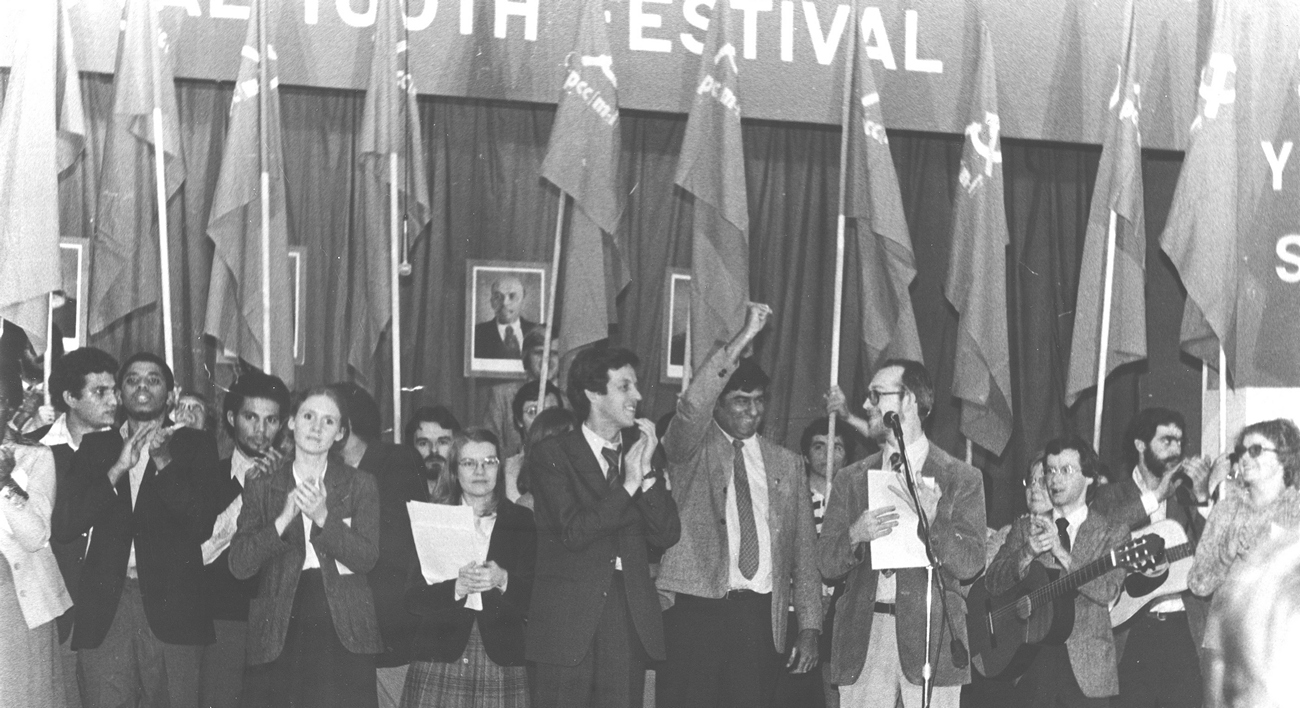
Hardial Bains at the
Second All-Canada National Youth Festival in 1979.
A red thread connecting his politics was the ideological struggle against the revision or dogmatic rendering of communist principles. Many of his writings address how the abandonment of progressive ideals and socialism was at the heart of the conflict in the former Soviet Union and Eastern Europe and the betrayal of the peoples' cause in various countries of the world. The fight against this abandonment was a salient feature of his activities from the 1960s.
As part of this, Hardial also played an important role in assisting the communist parties and organizations coming into being worldwide in the 60s and 70s and after. His internationalism was such that he never interfered in the internal affairs of others while also encouraging those in each country to be their own models and stand on their own two feet. In the 1990s, he assisted in organizing International Seminars on common problems. Seminars covered topics like the Retreat of Revolution, the Necessity for Modern Definitions, the Definition of the Modern Democratic Personality, Eurocentrism, Minority Rights, Communism and Human Rights, amongst others. He contributed greatly to strengthening working relations so as to analyze and assess world developments and ensure the political discussion needed by all was organized.
|
Hardial Bains was greatly admired amongst his colleagues and those he met in the course of his political activities for his dedication to the progress of humanity and adherence to the most advanced principles. The Canadian ruling elite despised his politics and targeted him for attack under the notorious program Operation Chaos led by the U.S. Central Intelligence Agency. He was continually slandered and defamed. He had to fight and defeated several fraudulent lawsuits aimed at criminalizing and discrediting him and he defied several attempts to assassinate him including trying to force the car he was in off the road and setting fire to its gas tank and other such desperate acts. He was the subject of an Interpol warrant during the War Measures Act in 1970, and denied Canadian citizenship until 1988, which carried with it the denial of the rights of his spouse and children. He was also deprived of his passport by the government of India from 1975 to 1977 during the emergency declared by Indira Gandhi. He was under the constant surveillance of the FBI and denied entry into the United States.
With the collapse of the Soviet Union in 1989-90 and the end of the bi-polar division of the world, Hardial took up bold all-sided work to create the conditions for the empowerment of the people and to resolve the all-sided crisis with economic crisis at the base, in their favour. His work for the democratic renewal of the political process gives the direction the polity requires today. He presented a brief on behalf of CPC(M-L) to the Royal Commission on Electoral Reform and Party Financing in 1990. Later, in 1992, he led the Committee to Vote No on October 26, which spearheaded the effort to defeat the reactionary Charlottetown Accord referendum by which the ruling class tried to reform the Constitution of Canada while keeping the polity divided, the working people in an inferior position, the Indigenous peoples oppressed and the rights of the Quebec nation denied. The Committee to Vote No prevailed in the face of the entire establishment forces badgering the people to vote yes. To assist the No campaign to win victory, Hardial published two books dealing with the constitutional problem in Canada -- The Essence of the Consensus Report on the Constitution and A Future to Face. He subsequently published a third book in 1993, A Power to Share, to show the way forward. A Power to Share focused on the necessity to carry out the democratic renewal of the political process. With the momentum and unity gained from the successful campaign to defeat the Charlottetown Accord, Hardial spearheaded the founding of the National Council for Renewal, which led to the creation of the Canadian Renewal Party as a non-partisan political association to continue the work of empowering Canadians.
 Hardial Bains speaks at meetings in
Toronto (left) and Ottawa as part of the work in 1992 for Democratic
Renewal and for a "No" vote on the Charlottetown Accord.
Hardial Bains speaks at meetings in
Toronto (left) and Ottawa as part of the work in 1992 for Democratic
Renewal and for a "No" vote on the Charlottetown Accord.
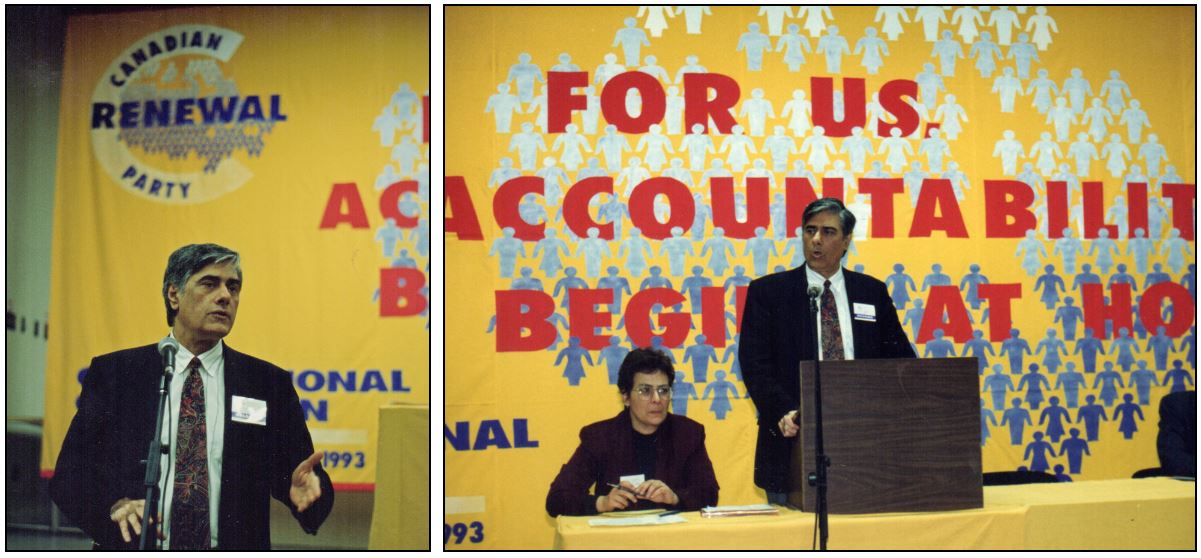 Hardial Bains speaks at the
constitutional conference of the Canadian Renewal Party held in Ottawa,
September 11-12, 1993.
Hardial Bains speaks at the
constitutional conference of the Canadian Renewal Party held in Ottawa,
September 11-12, 1993.
In 1995, he launched an Historic Initiative, a nation-building project which calls for the working class to constitute the nation and vest sovereignty in the people. His theoretical work focused on the need to settle scores with the old conscience of society in a manner which enables the modern democratic personality to emerge. Hardial embodied that democratic personality, with its social love and striving for a humanized society fit for human beings and nature. While his life was cut short by cancer in 1997, his life and work carry on in the ongoing work of the Communist Party of Canada (Marxist-Leninist) and in the hearts, minds and deeds of the younger generations that are following in his footsteps.
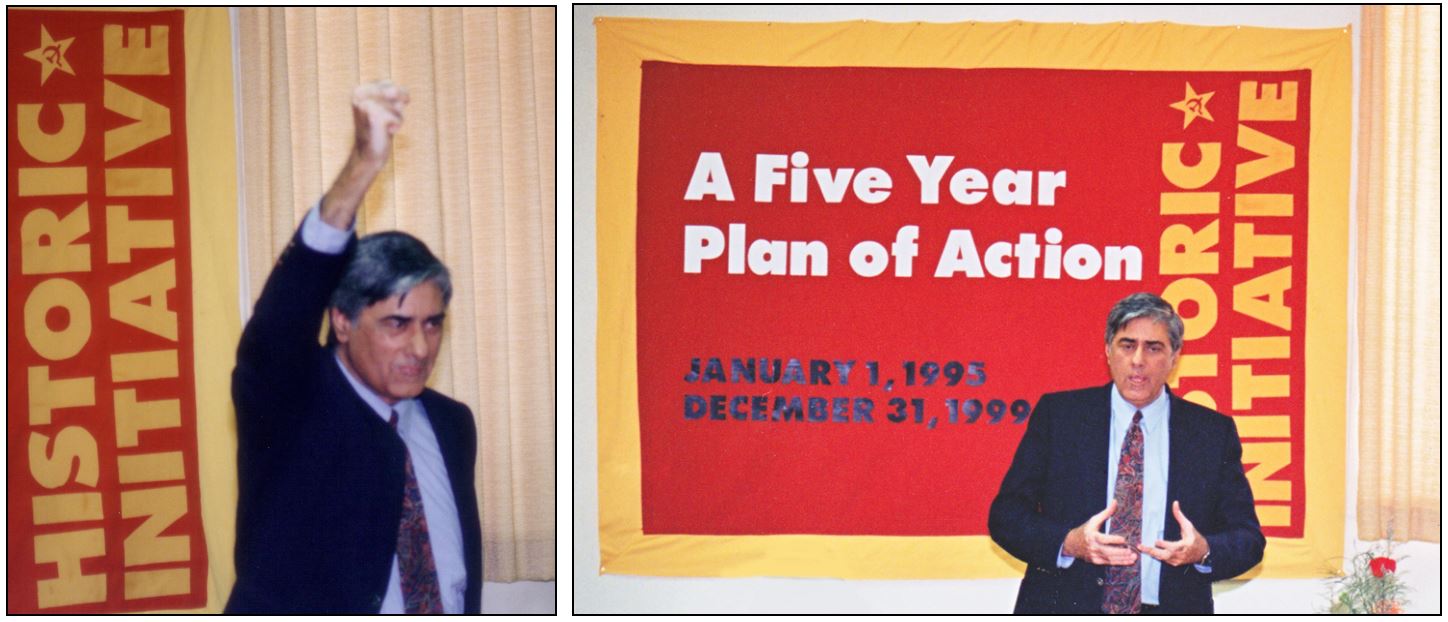 Hardial Bains launches
CPC(M-L)'s Historic Initiative in Ottawa, January 1, 1995.
Hardial Bains launches
CPC(M-L)'s Historic Initiative in Ottawa, January 1, 1995.
(Hardial Bains Resources Centre)
This article was published in

Volume 52 Number 3 - August
15, 2022
Article Link:
Hardial Bains -- Biographical Sketch
Website: www.cpcml.ca Email: editor@cpcml.ca
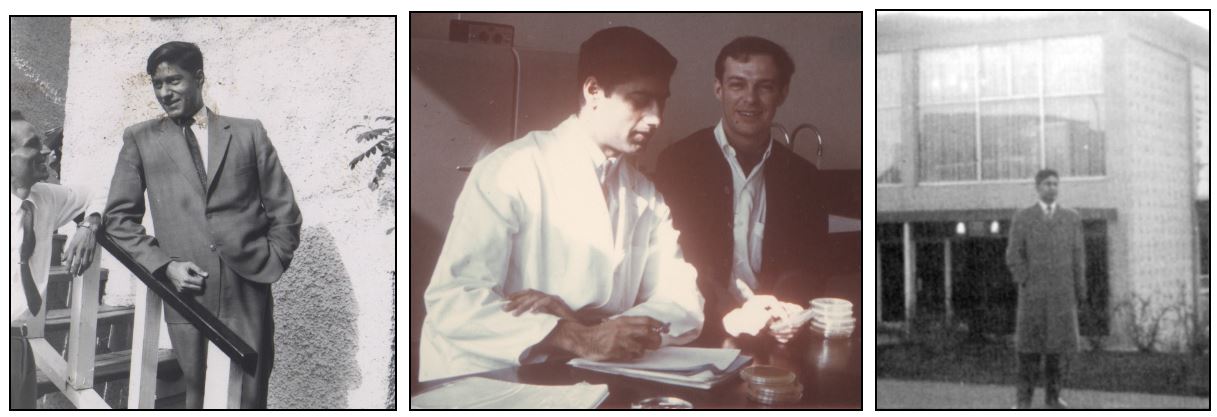 Hardial Bains shortly after his arrival in Canada
in 1960 (left); working in the lab; and in front of International House
at UBC in 1962.
Hardial Bains shortly after his arrival in Canada
in 1960 (left); working in the lab; and in front of International House
at UBC in 1962.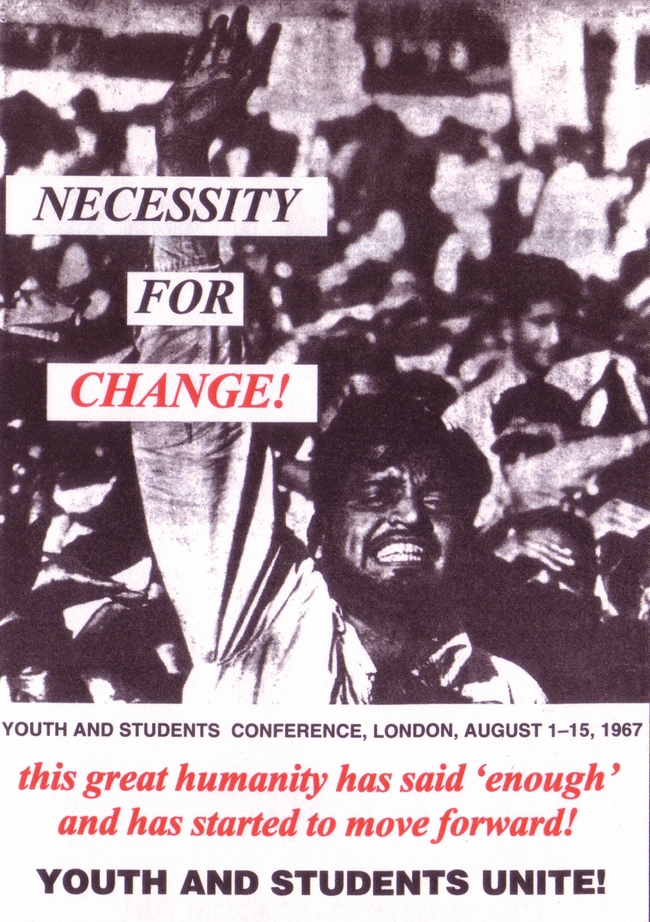 Hardial taught at Trinity
College in Dublin, Ireland from 1965 to 1967 as an exchange lecturer.
His teaching manual was still being used by the Department when Hardial
paid a visit to the university 25 years later.
Hardial taught at Trinity
College in Dublin, Ireland from 1965 to 1967 as an exchange lecturer.
His teaching manual was still being used by the Department when Hardial
paid a visit to the university 25 years later. Hardial Bains leads discussion at
the Necessity for Change Conference in London,
England
Hardial Bains leads discussion at
the Necessity for Change Conference in London,
England 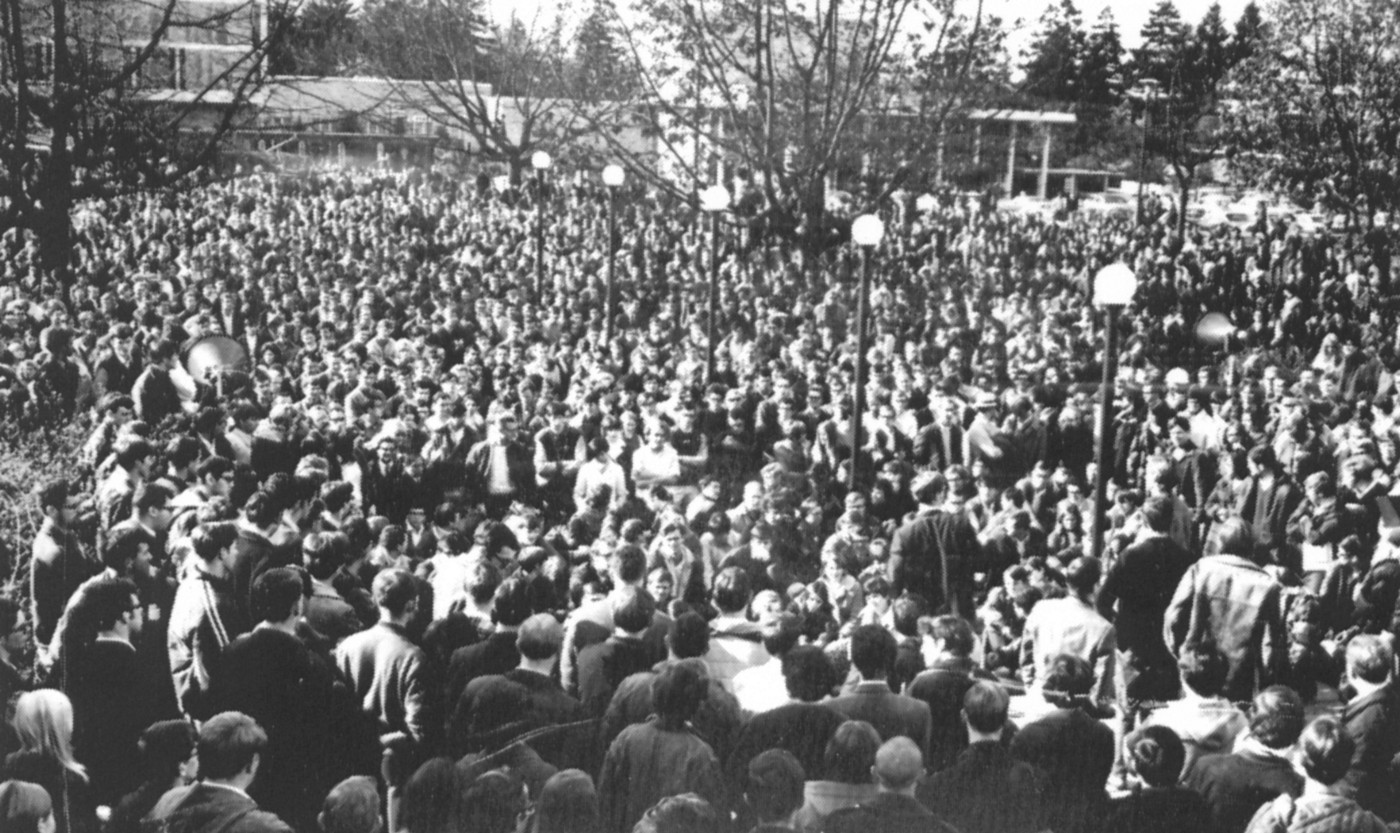
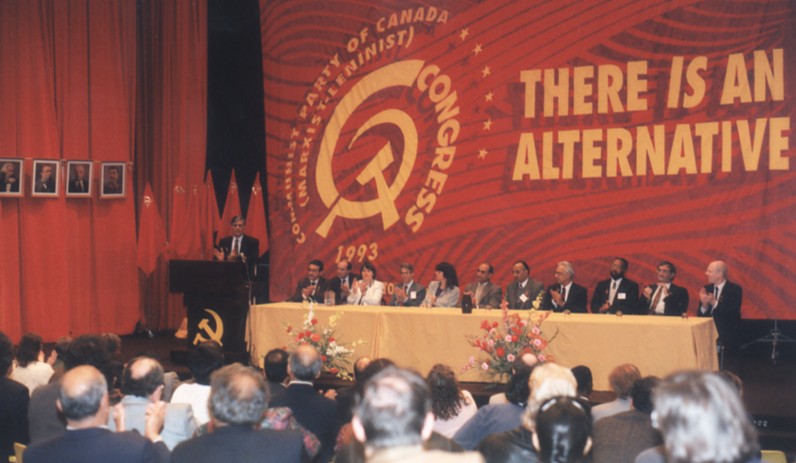 Hardial Bains addresses the Sixth
Congress of CPC(M-L) in October 1993.
Hardial Bains addresses the Sixth
Congress of CPC(M-L) in October 1993.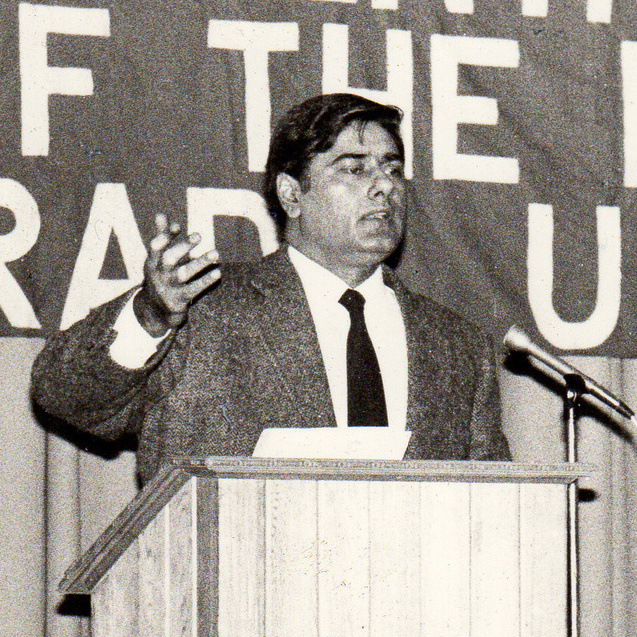
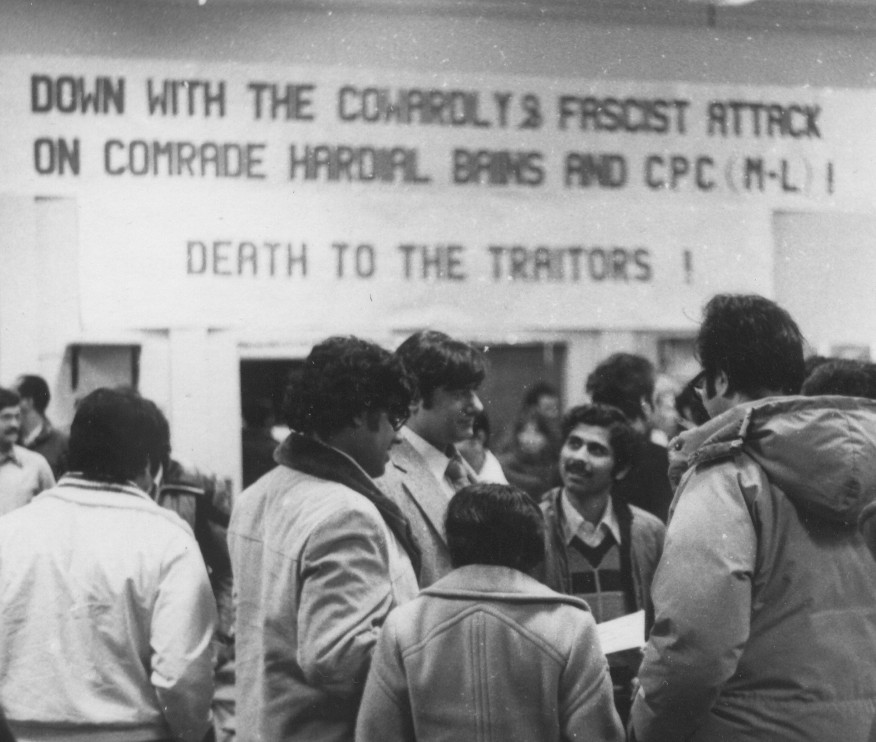 Hardial Bains at a rally called in
March 1977 after the Party's Workers' Centre was raided and he was
arrested on trumped-up charges.
Hardial Bains at a rally called in
March 1977 after the Party's Workers' Centre was raided and he was
arrested on trumped-up charges. 
